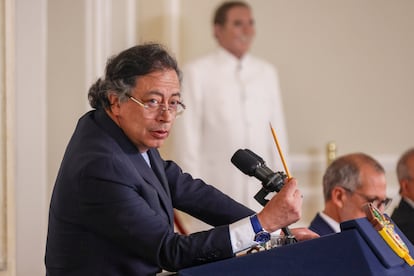Colombia’s Petro accumulates crises in wake of ‘Leyva case’
The foreign minister resigns, a diplomatic conflict with the US shows no signs of abating, and the justice system requests the arrest of the highest-ranking former government official over corruption

Colombian politics, under Gustavo Petro, move at a dizzying pace. The smiles seen at the Casa de Nariño, the seat of government, on Saturday, when the president successfully passed his pension reform, have now been replaced by nail-biting in the face of three new crises. The first political tremor came around 7 a.m. on Thursday, when Foreign Minister Laura Sarabia, Petro’s former right-hand aide at the Administrative Department of the Presidency (DAPRE), decided to publish her resignation letter: she is leaving after a disagreement with the head of state over a tender for printing passports. Good luck, Petro replied.
Two hours later, a judge requested an arrest warrant for another former DAPRE director, Carlos Ramón González, for being at the center of a corruption case. The president said nothing. The third blow, the biggest, came from the United States, where Secretary of State Marco Rubio decided to recall his acting ambassador in Bogotá for consultations due to the “baseless and reprehensible statements from senior Colombian government officials.”
The move came after Petro requested an investigation into whether his former foreign minister, Álvaro Leyva, sought the support of two U.S. Republican congressmen to stage a coup against him, following leaked audios published by EL PAÍS. Petro, who prefers to manage diplomatic relations through social media, took up Rubio’s challenge: he also recalled his ambassador in Washington for consultations. The damage has yet to be measured.
Petro appears calm; chaos doesn’t intimidate him. Speaking at the inauguration of a new Constitutional Court justice, he again denounced a Dubai-based “drug trafficking junta,” said he would be willing to work hand in hand with President Donald Trump against transnational crime, and spoke again about ending inequality and the environment. Nothing was said about González or Sarabia, and very little about the Secretary of State. “I don’t think Marco Rubio is involved in a coup against Petro, because the far-right figures involved in that didn’t make it to his office but to someone else’s office,” he said. “And that’s a matter for the Attorney General to determine, not me.” Petro has asked the Attorney General’s Office to investigate Leyva for treason.
The three crises highlight three of the president’s weaknesses, the chief one being his relationship with the United States. A first crisis with the Trump administration occurred earlier this year, when the U.S. president threatened Colombia with tariffs after Petro’s decision to return two planes carrying chained migrants. The crisis was resolved, but the relationship has remained passive-aggressive ever since. In his Thursday address, Rubio criticized the Colombian administration’s “irresponsible statements,” expressed his “deep concern” about the current state of bilateral relations, and at the same time emphasized that Colombia is an important “strategic ally.” Politicians on both sides are no experts at lowering their tone either. Florida Representative Carlos Antonio Giménez, whom Álvaro Leyva mentions as one of the politicians he met with, attacked Petro on Thursday as a “narco-terrorist and socialist who lives in the Casa de Nariño.” Colombian Interior Minister Armando Benedetti responded that “with this language and ideas, anyone would think he might support a coup d’état.”
The Colombian president’s inner circle has changed a lot since his administration began, but not only because his allies, like Sarabia, are resigning. Also because those who are very loyal to him are under investigation by the justice system. This is another one of the president’s weaknesses: the corruption scandal at the National Risk Management Unit (UNGRD), which is increasingly looming over his office. The arrest warrant for Carlos Ramón González raises new questions about the extent of corruption in the Cabinet. The former director of DAPRE was one of the president’s closest officials. He is now being charged by the Prosecutor’s Office for allegedly asking the then director of UNGRD, Olmedo López, to inflate a contract that was initially worth 46.8 billion pesos (more than $11 million). The money would then go to pay bribes for Iván Name, former president of the Senate, and Andrés Calle, of the House of Representatives. Authorities have already arrested others in this corruption scandal. But González is, of all those investigated, the highest-ranking former official, and closest to Petro.
Just a few days ago, the government was celebrating the president’s signature on the labor reform, the approval of the pension reform in Congress, and the Constitutional Court’s decision that the National Electoral Council could not investigate the president. Today, the crises are piling up. Happiness is fleeting in the government of change.
Sign up for our weekly newsletter to get more English-language news coverage from EL PAÍS USA Edition
Tu suscripción se está usando en otro dispositivo
¿Quieres añadir otro usuario a tu suscripción?
Si continúas leyendo en este dispositivo, no se podrá leer en el otro.
FlechaTu suscripción se está usando en otro dispositivo y solo puedes acceder a EL PAÍS desde un dispositivo a la vez.
Si quieres compartir tu cuenta, cambia tu suscripción a la modalidad Premium, así podrás añadir otro usuario. Cada uno accederá con su propia cuenta de email, lo que os permitirá personalizar vuestra experiencia en EL PAÍS.
¿Tienes una suscripción de empresa? Accede aquí para contratar más cuentas.
En el caso de no saber quién está usando tu cuenta, te recomendamos cambiar tu contraseña aquí.
Si decides continuar compartiendo tu cuenta, este mensaje se mostrará en tu dispositivo y en el de la otra persona que está usando tu cuenta de forma indefinida, afectando a tu experiencia de lectura. Puedes consultar aquí los términos y condiciones de la suscripción digital.









































